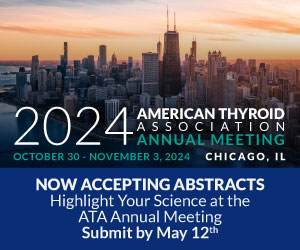From the American Thyroid Association:
In collaboration with the Food and Drug Administration (FDA), and as a service to our members, ATA will provide updates on recent FDA approvals and other important FDA actions (e.g., updated safety information, new prescribing information) pertaining to therapies for cancer patients. This will allow the agency to inform oncologists and professionals in oncology-related fields in a timely manner. Included in the email from the FDA will be a link to the product label or to other sites for additional relevant clinical information. The following is a message from the FDA’s Office of Hematology and Oncology Products Director, Dr. Richard Pazdur:
On November 22, 2013, the U. S. Food and Drug Administration approved sorafenib (NEXAVAR® tablets, Bayer Healthcare Pharmaceuticals Inc.) for the treatment of locally recurrent or metastatic, progressive, differentiated thyroid carcinoma (DTC) refractory to radioactive iodine treatment. Sorafenib was previously approved for treatment of renal cell carcinoma (2005) and hepatocellular carcinoma (2007).
The current approval was based on the results of a multicenter, double-blind, placebo-controlled trial conducted in 417 patients with locally recurrent or metastatic, progressive DTC refractory to radioactive iodine treatment. Patients had papillary (57%), follicular (25%), and poorly differentiated carcinomas (10%). Ninety-six percent of patients had metastases (pulmonary, 86%; lymph nodes, 51%; and bone, 27%).
Approximately half of the patients were male, the median age was 63 years, 68% had no uptake of radioactive iodine (RAI), and 34% had received a cumulative dose of at least 600 mCi of RAI. The median cumulative RAI activity administered prior to study entry was 400 mCi.
Patients were randomized (1:1) to receive sorafenib 400 mg orally twice daily or matching placebo. The trial demonstrated an improvement in progression-free survival (PFS) as assessed by blinded independent radiological review. The median PFS was 10.8 and 5.8 months for the sorafenib and placebo arms, respectively [HR 0.59 (95% CI: 0.46, 0.76, p<0.001)]. The overall response rates were 12% versus 1% for the sorafenib and placebo arms, respectively. No complete responses were observed. Following investigator-determined disease progression, 157 (75%) patients randomized to placebo crossed over to open-label sorafenib. After 33% of events, the overall survival was not significantly different [HR 0.88 (95% CI: 0.63, 1.24 p=0.47)].
Sixty-six percent of patients receiving sorafenib had dose interruptions for adverse reactions; 64% had dose reductions. Treatment discontinuation for adverse reactions was reported in 14% and 1.4% in the sorafenib and placebo arms, respectively.
The most common (greater than or equal to 10%) adverse reactions included hand-foot skin reaction, diarrhea, alopecia, weight loss, hypertension, rash, decreased appetite, stomatitis, nausea, pruritus, and abdominal pain. Other significant adverse reactions reported include squamous cell carcinoma of the skin (3%) and hypocalcemia (36%).
In this population with adequate thyroid suppression [99% with baseline thyroid stimulating hormone (TSH) levels less than 0.5 mU/L], elevation of TSH levels above 0.5 mU/L were observed in 41% of sorafenib-treated patients compared to 16% of patients receiving placebo. The median time-to-loss of adequate thyroid suppression was 4.6 months in the sorafenib-treated group (range 1 to 22 months). An increase in thyroid replacement medication was necessary to re-acquire thyroid suppression. Inadequate TSH suppression may promote thyroid cancer and, therefore, TSH levels should be monitored monthly and thyroid replacement therapy be adjusted.
The recommended dose and schedule for NEXAVAR® is 400 mg (two 200 mg tablets) taken twice daily without food (at least 1 hour before or 2 hours after a meal).
Full prescribing information is available at: http://www.accessdata.fda.gov/drugsatfda_docs/label/2013/021923s016lbl.pdf
Healthcare professionals should report all serious adverse events suspected to be associated with the use of any medicine and device to FDA’s MedWatch Reporting System by completing a form online at http://www.fda.gov/medwatch/report.htm, by faxing (1-800-FDA-0178) or mailing the postage-paid address form provided online, or by telephone (1-800-FDA-1088).



